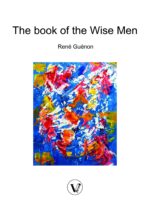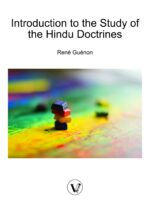Insights into Islamic Esoterism and Taoism
In Insights into Islamic Esoterism and Taoism, René Guénon explores the profound metaphysical teachings and spiritual practices at the heart of two of the world’s most revered traditions: Islam and Taoism. Drawing on his deep understanding of both, Guénon unveils the esoteric dimensions of each, revealing their shared principles and timeless wisdom.
Through a careful analysis of Sufism and Taoist thought, Guénon uncovers the hidden threads that connect these paths of inner realization, offering readers a comparative study of their symbolism, metaphysics, and the universal truths they embody. He highlights the common metaphysical foundation that transcends religious boundaries, emphasizing the universal nature of the spiritual quest.
With his trademark clarity and intellectual rigor, Guénon invites readers to explore the deeper, often overlooked aspects of Islamic esoterism and Taoism, showing how they provide a path toward spiritual enlightenment and unity with the divine. This work is an indispensable resource for those seeking to understand the universal principles that underlie all true spiritual traditions.
E-book
Epub, Mobipocket, Web, Send-to-Kindle
REVIEW QUOTES:
“This work should be considered among Guenon’s masterworks. It is an erudite, deep exposition of traditional Islamic and Taoist metaphysics and esoteric doctrine, showing on a principal level the mutual affinities, resonances, and harmonious points between two seemingly dissimilar traditions, the Arabian Islamic tradition and Chinese Taoist tradition, and where on the level of principia they are actually quite mutually harmonious in many ways, though not without their quite real points of divergence.
This book also contains much lore that would be difficult to otherwise come by. I recommend an open minded reading. Moreover the design is, as oft the case with Sophia Perennis press, aesthetically pleasing. Reading the book was both an aesthetic and intellectual pleasure.” –K. Southall’s Reviews – Amazon.com
“First published in 1973 as “Aperçus sur l’ésoterisme islamique et le taoisme” (Gallimard, Paris), this book is a posthumous collection of articles that Guénon (who died in 1951) wrote for various french journals. As such, there is no overiding theme to the book as one finds in the works of Guénon that were conceived as books in the first place. However, as Guénon says on several occasions, his “sole interest” being the universal and timeless metaphysic or “wisdom” that lies at the heart of every tradition, and which he calls the “Primordial Tradition”, the diverse articles of this collection hang together like the beads of a necklace, of which the cord is metaphysical truth. One may use this analogy, indeed, to describe the ensemble of Guénon’s work, which are partly characterised by their lack of “development”, as if they were all conceived at the same moment and simply written out over the years; and this because true ideas, as Guénon reminds us, do not change or “develop” but remain as they are in the timeless “present”.
Eight of the articles presented in this collection are devoted to the islamic tradition, in particular to various aspects of islamic esoterism or “Tasawwuf”, the arabic term for what is popularly called “Sufism” in the West and which literally means “initiation”. Subjects covered in these articles include: the relationship between the exoteric and esoteric dimensions of Islam, which Guénon shows to be inseperable and reciprocal; the doctrine of Unity (at-Tawhid); the notion of “spiritual poverty” (al-Faqr); the Spirit (ar-Ruh); the angelogy of the arabic alphabet; the islamic science of hand-reading; and the influence of the islamic civilization on the West.
After these comes an essay on the important difference between the religious doctrine, or dogma, of “creation” and the metaphysical doctrine of “manifestation”, which Guénon shows to be two ways of expressing the same fundamental truth, namely, the absolute dependence of all created or manifested things upon the divine and supreme Principle.
The final chapter deals with the Chinese tradition in which the exoteric and esoteric domains are represented by Confucianism and Taoism respectively. Commenting on the more or less complete destruction of the former under the communist regime, Guénon reminds us that, while Confucianism, as the exterior aspect of the Chinese tradition, may disappear, Taoism, being the interior aspect of the tradition, never will, for it is in essence beyond all contingencies like the Truth itself.
The islamic articles give a precise and masterful summary of what constitutes, essentially, islamic esoterism and are obviously written by someone who, while recognising the truth in all traditional forms, nevertheless had a personal attachment to one form in particular, namely Islam. As such, this book will serve as a refreshing antidote to the “pseudo-Sufi” literature that is now circulating in the modern world, the productions of individuals who call themselves “Sufi” without, however, having any fidelity to the Islamic tradition. But Sufism, or better, Tasawwuf, as Guénon shows, is the internal dimension of Islam, with initiatic chains that go back all the way to the Prophet Muhammed himself. “Sufism,” writes Guénon, “is arab like the Qu’ran itself, in which it has it’s direct principles”.
In short, without adherence to Islam, Guénon is saying, there is no real Tasawwuf, hence no real spirituality. After reading this book, one will be left in no doubt of this and one will have a much deeper understanding of what, essentially, constitutes Islamic esoterism and, with that, a deeper understanding of what constitutes esoterism in general.” – Richard B. Forsaith’s Reviews – Amazon.com
- Format: Epub
- Pages : 112
- ISBN : 9782487364363
Additional information
| Epub | $10.99 |
|---|---|
| Paper | Soon |





